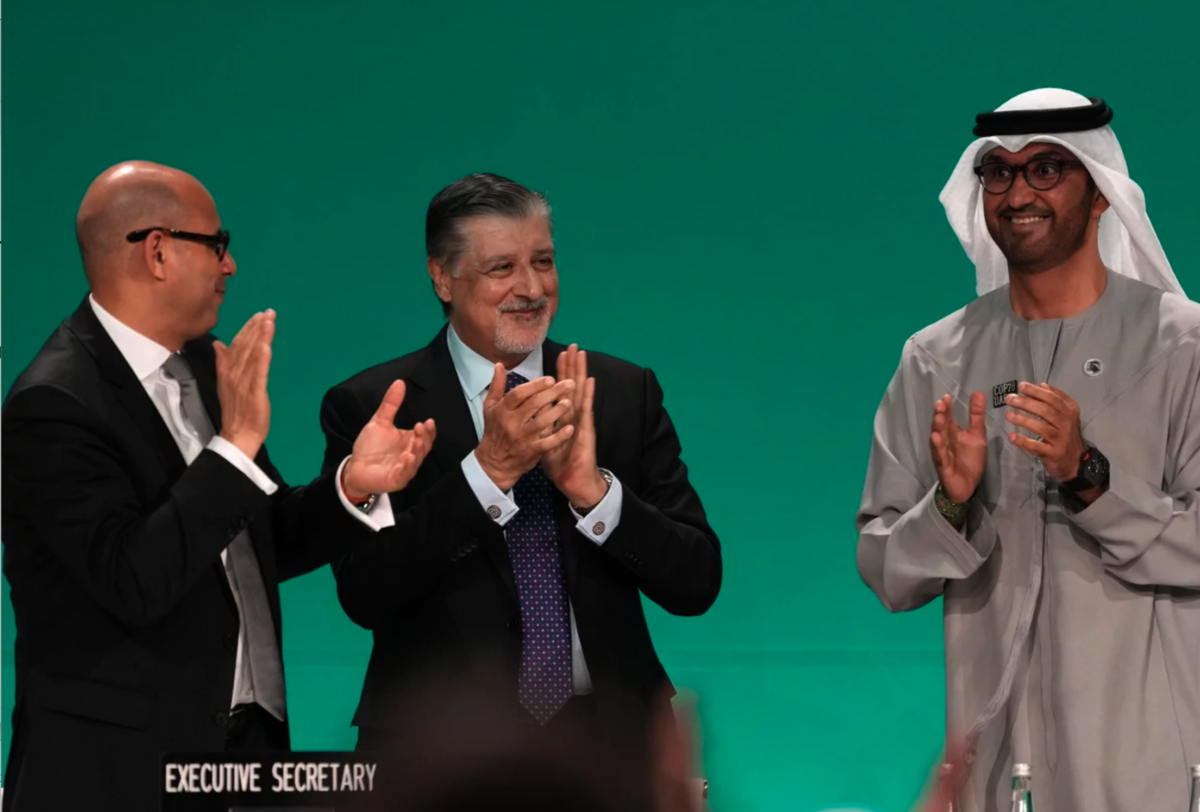
Sultan al-Jaber of the United Arab Emirates, right, celebrates the end of the COP28 climate meeting with United Nations Climate Chief Simon Stiell, left, and COP28 CEO Adnan Amin on Dec. 13, 2023, in Dubai: NAJ screen shot
Staff Report –
WASHINGTON, D.C. — In the final weeks of the hottest year in recorded history, the United Nations climate conference in Dubai known as COP28 ended Wednesday with an agreement for the first time to call on countries to transition away from fossil fuels, the chief cause of climate change due to global warming from the burning of fossil fuels for energy and transportation.
“It’s embarrassing that it took 28 years but now we’re finally there,” said Dan Jørgensen, Denmark’s climate minister. “Now it finally seems like the world has acknowledged that we need to move away from fossil [fuels].”
The agreement comes after more than two weeks of contentious negotiations among nearly every country in the world.
COP28 president Sultan al-Jaber opened Wednesday’s plenary meeting, and within a few minutes announced that agreement had been reached on the main document.
“It is a plan that is led by the science,” al-Jaber said. “It is an enhanced, balanced, but make no mistake, a historic package to accelerate climate action.”
Members of the alliance and climate activists called for a clear path towards phasing out fossil fuels, which are responsible for 75 percent of global warming.
“It is not enough for us to reference the science and then make agreements that ignore what the science is telling us we need to do,” Anne Rasmussen of Samoa told world leaders as the meeting ended.
Speaking on behalf of the Alliance of Small Island States coalition, she pointed out that the final deal does not require countries to stop using fossil fuels by any particular date. “This is not an approach that we should be asked to defend,” she said.
Not all countries – particularly those at the greatest risk from the rapidly warming world – were satisfied with the decision, which ended more than 24 hours after the summit’s scheduled close. Amidst the congratulations and speeches, some countries expressed their outrage at not being allowed to comment on a final text they felt did not go far enough to address the threats from global warming, especially to developing nations.
The AOSIS, which represents countries that have contributed little to global climate change but are already being overrun by sea-level rise, said it saw a “litany of loopholes,” in the final text.
Yet the science on climate change is clear.
To limit the worst effects of planetary warming – runaway sea level rise, mass extinction of plants and animals, and damaging and deadly wildfires, hurricanes, droughts, heatwaves and floods – the world needs to rapidly reduce its emissions of climate-warming fossil fuels.
In 2015, world leaders agreed to limit warming to below 2 degrees Celsius, and ideally below 1.5 degrees Celsius (2.7 degrees Fahrenheit), compared to pre-industrial times. Scientists say that warming above 1.5 degrees Celsius would put global food systems at risk, spell the end of most of the world’s coral reefs and potentially trigger climate tipping points like the melting of permafrost, which could accelerate warming regardless of other human actions.
The world has already warmed roughly 1.2 degrees Celsius, said Jim Skea, chair of the U.N. Intergovernmental Panel on Climate Change.
Keeping 1.5 alive, the oft-quoted goal of these climate summits is “still possible – just,” Skea said. But, he added, “We continue to emit. So it’s becoming harder and harder to imagine that we’re going to limit warming at 1.5 degrees and at some point, if we carry on as we are, we’ll run out of rope.”
One of the biggest breakthroughs of COP28 is that, for the first time, millions of dollars will be directed to developing countries that are already suffering damage from climate change.
For years, developing countries have argued they’re paying for devastating impacts that richer nations are largely responsible for. Wealthier countries like the U.S. and those in Europe have historically contributed the biggest share of emissions from fossil fuel use that are causing the planet to heat up. As weather extremes get worse and sea levels rise, developing countries are shouldering the cost of what’s known as “loss and damage.”
At climate talks a year ago, nations agreed to establish a new loss and damage fund. Now, more than $700 million has been announced for it, most from European countries and $100 million coming from the United Arab Emirates.
___
If you support truth in reporting with no paywall, and fearless writing with no popup ads or sponsored content, consider making a contribution today with GoFundMe or Patreon or PayPal. We just tell it like it is, no sensational clickbait or pretentious BS.













